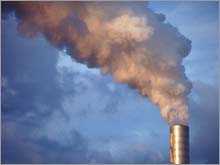Institutional investors call for carbon cutsMerrill Lynch, Allianz, CalPERS join growing chorus of business-types pushing national laws that would curb greenhouse gas emissions.NEW YORK (CNNMoney.com) -- A coalition of institutional investors with more than $4 trillion under management called Monday for the government to set national, mandatory standards to cut greenhouse gas emissions. "We cannot wait one day longer to pass mandatory controls on carbon," said Mindy Lubber, director of the the Investor Network on Climate Risk, one of the organizations involved in this announcement.  While a host of companies - including Alcoa (Charts), BP (Charts), Duke Energy (Charts) and PG&E (Charts) - have recently called for mandatory carbon controls so they can better plan their long-range capital projects, Lubber said this was the first time a group of large investors have pushed the same agenda. Investors, like industries, seem to be longing for the certainty that a nationwide law would bring. Such regulation might also foster more companies with carbon control technology, creating more investment opportunities. "Does the technical ingenuity that we need to solve these problems follow capital?" asked Mark Goldfus, a senior vice president at Merrill Lynch, one of the coalition members. "[It does] predictably." "[Laws] provide disincentives to emit carbon, and incentives to invest in solutions," said Goldfus. In addition to Merrill Lynch (Charts), investors behind Monday's announcement included Allianz (Charts), the California Public Employees Retirement System (CalPERS), and several pension funds for labor unions and state governments. Lubber mentioned tradable caps on carbon emissions as one market-based approach to cutting greenhouse gasses, but said a tax might also work. She said the coalition's goal was to reduce carbon emissions in the U.S. by 60 to 90 percent from 1990 levels by 2050. There are currently no federal carbon controls in place; thus far industrial emission controls have been voluntary. This is an approach that's favored by the Bush administration, but that hasn't been particularly effective so far in reducing total carbon output. Indeed, several states in the Northeast as well as California are moving to or have moved to mandatory caps in response to what they see as inaction by the federal government. Lubber argued that a mandatory cap would not hurt economic growth - a sticking point that so concerned the Senate when it failed to ratify the carbon-restricting Kyoto Protocol in 1997. The Senate vote was 95-0. When asked what was different between now and then, coalition spokesman Peyton Fleming said that attitudes have shifted. "There was a lot of uncertainty," said Fleming. "That has changed. There is a growing consensus that regulation is needed." Merrill's Goldfus called on the Securities and Exchange Commission to better require companies to disclose their carbon usage. "If it doesn't get measured, it doesn't get managed," he said. Man-made carbon that's found in the atmosphere, in the form of gaseous carbon dioxide, comes largely from the burning of fossil fuels in things like electricity generation and vehicle use. Scientists have said it is one of the primary culprits in global warming. _____________ |
Sponsors
|

